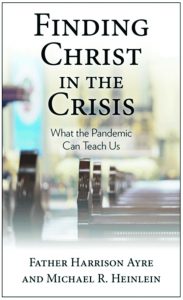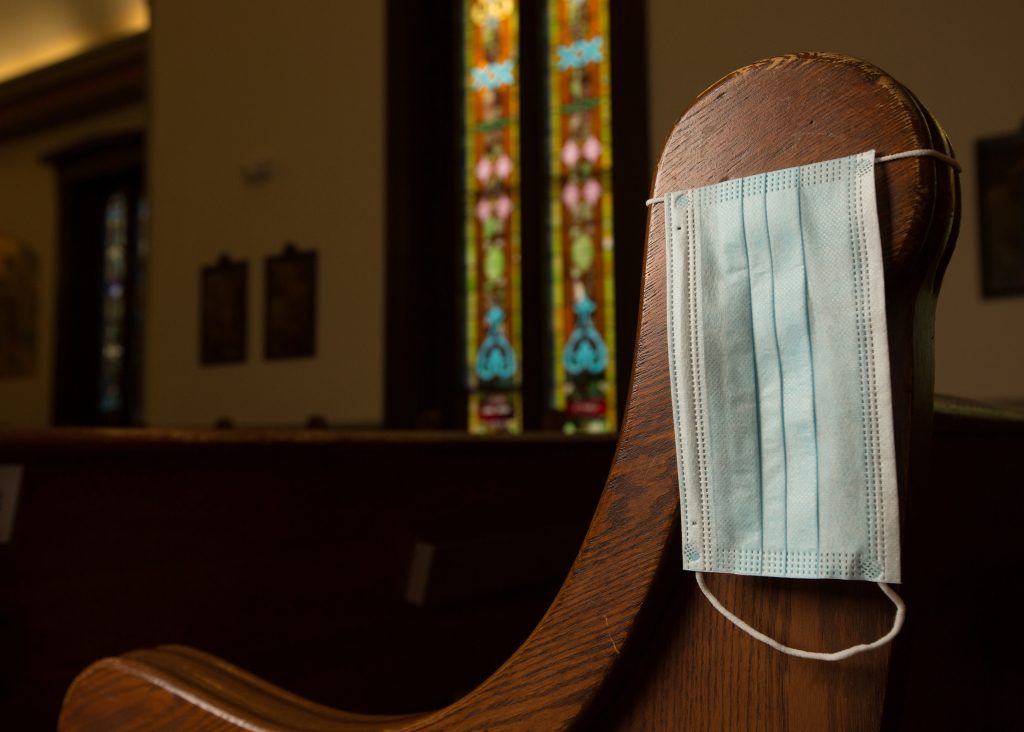If you’ve felt abandoned this year, you are far from alone — suffering tends to do that.
And what a year of suffering it has been. A pandemic, political strife, unrest in our cities, and a sense of division and confusion even in the Church can all seem like too much.
In Christianity, however, we have a God who draws us near in such trials — and even uses them to teach us some useful lessons.

The new e-booklet, “Finding Christ in the Crisis: What the Pandemic Can Teach Us” (Our Sunday Visitor, $1.95), is perhaps the first serious written attempt to figure out what those lessons are. Thankfully, authors Father Harrison Ayre and writer Michael Heinlein prove to be helpful guides in discerning the graces of the time of the novel coronavirus.
For me (and surely for many Catholics), the first grace that comes to mind has been the longing for the Eucharist that we experienced at the beginning of the pandemic.
All of a sudden, what helped keep us spiritually breathing was taken away. We all witnessed or heard stories of priests going around to parishioners’ homes and blessing them with the Blessed Sacrament. Some went out of their way to provide the sacraments of confession and the Eucharist when and where possible.
But still, that feeling of abandonment, even frustration with the decisions made over access to the sacrament, is hard to avoid at times. While recognizing the essential nature of the sacraments, Father Ayre and Heinlein remind us that “the sacraments are a communion with the entire Church, because communion with Christ is communion with all who constitute his body.”
“In the end,” they write, “reception of the sacraments is meant for the good of the Church and humanity, which is to say more than just for our own good.”

What Father Ayre and Heinlein try to emphasize are the ways in which this time has been an opportunity — a notion that is perhaps easier to see for those of us who have regular access to the sacraments again.
When it comes to the Eucharist, that “good” comes from Christ’s sacrifice on the cross, to which we are united in the sacrament.
“This reality,” the authors write, “should bring us great comfort even in the midst of pandemic, when we might not be able to make it to Mass. Because of our unity in Christ’s body through baptism, even when we are not physically present at the Eucharistic sacrifice, each of us is united to every Mass.”
As an example, the authors point to St. Charles Borromeo, who during times of plague in 16th-century Italy would ask priests to celebrate Mass outdoors so that people could watch from their homes.
But perhaps even more importantly, Father Ayre and Heinlein tackle the existential meaning of what such a crisis means for people of faith, reminding us that “God uses our history to bring us closer to himself.”
“Understanding this is essential to seeing God’s action in the present,” they write. “As God used the Babylonian exile for Israel’s good, he can use this pandemic to draw his Church closer to himself through Christ. God’s freedom never overwhelms, but always cooperates with humanity. That can help us understand the events of our world without falling into discouragement or despair.”
How is God using COVID-19 to draw his Church closer to himself? Well, for one, it has definitely challenged us to trust that God really, truly provides, even in the midst of suffering. Isn’t that what the cross of Christ is — him taking on our suffering to redeem it?
If we believe that, it changes everything. Yes, we must be prudent, but we also can’t hide in fear binging on Netflix, waiting it out until the threat of COVID-19 passes. We love. We care for our neighbor, even with masks and social distancing. And we pray. We listen for the voice of God in Scripture and the sacraments.
In the meantime, the clear message from Father Ayre and Heinlein’s analysis is that we take advantage of this “opportunity for deep purification of the Church,” similar to what the people of Israel experienced in exile.
“God had to remove a lot from Israel in order for them to see their mission clearly again,” they point out, comparing clergy-related scandals and hints of lukewarmness of faith to the trials of the Israelites.
The authors wonder: “Might God be drawing us into a time of purification to recommit ourselves to the covenant and mission he has established in his Church?”

There can be little doubt that they are right. I think back to a Pew Research study suggesting that many Catholics do not believe in the Real Presence of Jesus in the Eucharist. Those are the people, perhaps, who are not coming back to church after the pandemic.
For those who do, though, are we living our lives as monstrances in the world, showing God? The other day I watched a woman scream at another woman running into Planned Parenthood: “Jesus wants to save your soul!” I suspect the hollering didn’t make her curious about just who this Savior is. But by blazing charity, as St. Catherine of Siena would put it, perhaps she will.
As Father Ayre and Heinlein put it, “As disciples we are called to follow Christ’s way more and more each day, and that is, of course, ultimately the way of the cross. That Christian journey is the way of charity, service, and sacrifice.”
Our mission, they write, is “the love of Christ and his cross, the love that has motivated and sustained the saints — the very love in which we are daily called to persevere.”
Or, as the closing words of the Mass put it, “Go in peace, glorifying the Lord by your life.”
Having survived 2020, we are called to take this mandate more seriously and be Christ’s peace in this chaotic world.

